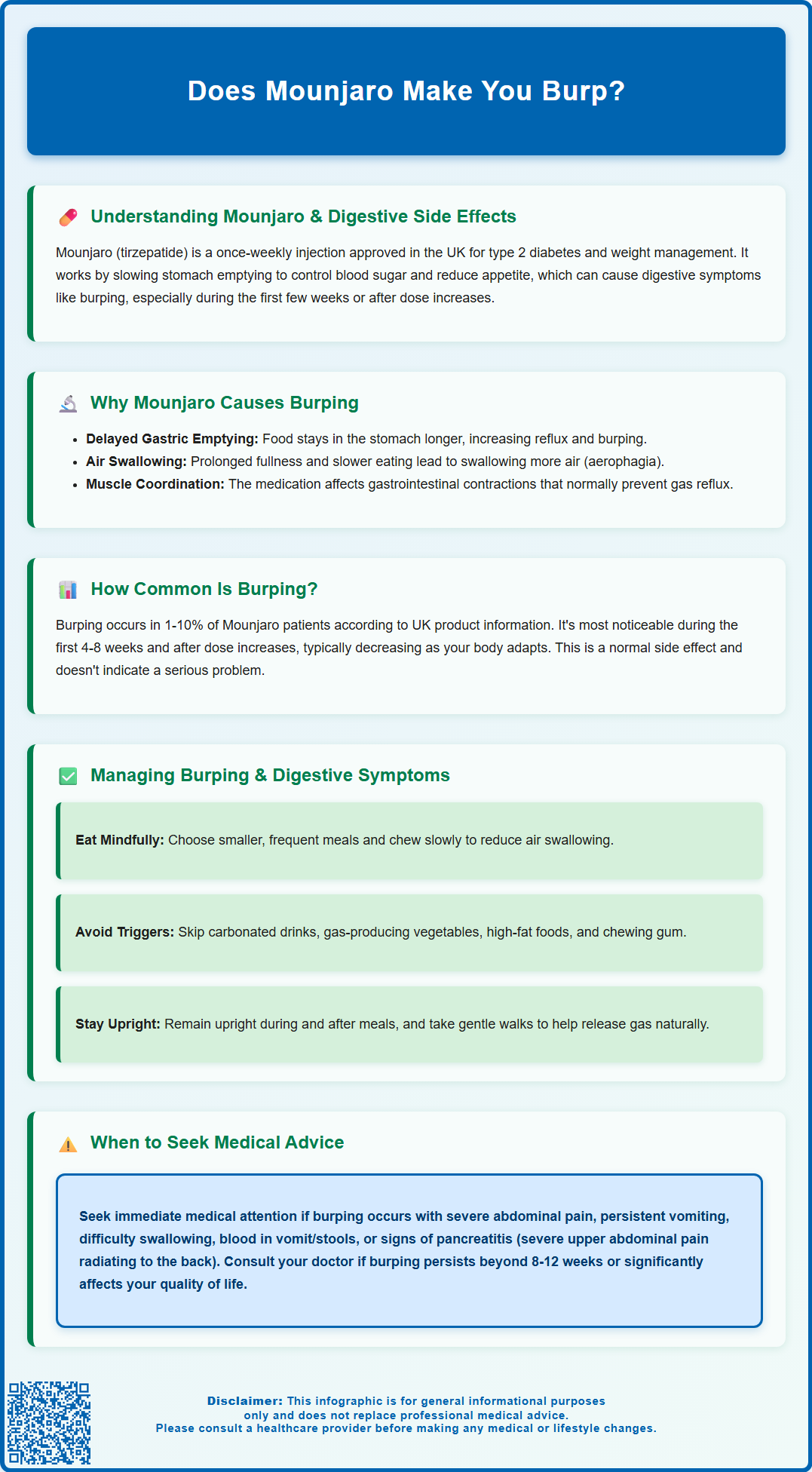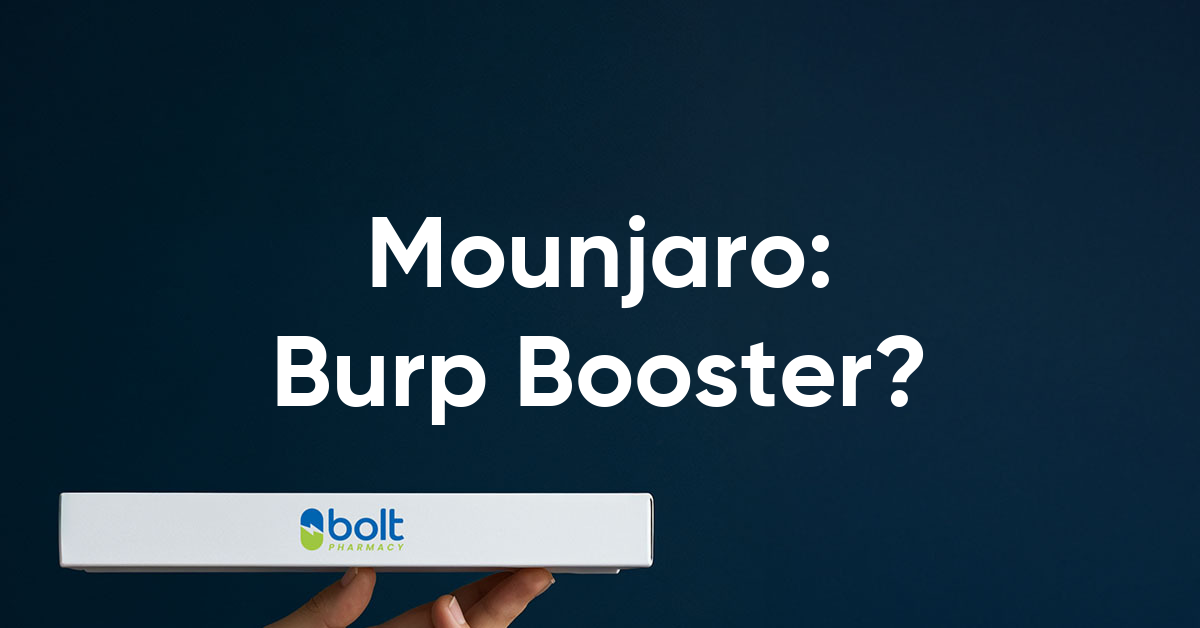Does Mounjaro make you burp? Yes, burping (eructation) is a recognised common side effect of Mounjaro (tirzepatide), affecting between 1% and 10% of patients. This once-weekly injectable medication, licensed in the UK for type 2 diabetes and weight management, works by slowing gastric emptying—a mechanism that contributes to both its therapeutic benefits and gastrointestinal symptoms. Burping typically occurs during the initial weeks of treatment or following dose increases, as the body adapts to delayed stomach emptying. Understanding why this happens and how to manage it can help patients continue treatment comfortably whilst achieving their health goals.
Summary: Mounjaro (tirzepatide) can cause burping in 1–10% of patients, primarily due to delayed gastric emptying that increases air accumulation and gastro-oesophageal reflux.
- Tirzepatide is a dual GIP and GLP-1 receptor agonist that slows gastric emptying, contributing to burping and other gastrointestinal symptoms.
- Burping is classified as a common side effect (≥1/100 to <1/10 patients) in the UK Summary of Product Characteristics.
- Symptoms typically occur during initial treatment weeks or after dose escalations and generally diminish as the body adapts.
- Dietary modifications—smaller meals, avoiding carbonated drinks and gas-producing foods—can significantly reduce burping frequency.
- Patients should seek medical advice if burping accompanies severe abdominal pain, persistent vomiting, difficulty swallowing, or signs of pancreatitis.
Table of Contents
Understanding Mounjaro and Gastrointestinal Side Effects
Mounjaro (tirzepatide) is a once-weekly injectable medication licensed in the UK for the treatment of type 2 diabetes mellitus and for weight management in adults with obesity (BMI ≥30 kg/m²) or overweight (BMI ≥27 kg/m²) with at least one weight-related comorbidity, as an adjunct to reduced-calorie diet and increased physical activity. As a dual glucose-dependent insulinotropic polypeptide (GIP) and glucagon-like peptide-1 (GLP-1) receptor agonist, Mounjaro works by mimicking naturally occurring incretin hormones that regulate blood glucose levels and appetite.
The mechanism of action of tirzepatide involves slowing gastric emptying—the rate at which food moves from the stomach into the small intestine. This delayed gastric emptying contributes significantly to the medication's effectiveness in promoting satiety and reducing caloric intake, but it also underlies many of the gastrointestinal side effects commonly reported by patients. Burping, belching, and eructation are among the digestive symptoms that some individuals experience when taking Mounjaro, particularly during the initial weeks of treatment or following dose escalations.
Gastrointestinal adverse effects represent the most frequently reported side effects associated with GLP-1 receptor agonists and dual agonists like Mounjaro. According to the UK Summary of Product Characteristics (SmPC), many patients experience gastrointestinal symptoms during treatment, with nausea, diarrhoea and vomiting being very common (affecting ≥1/10 patients). These effects are generally mild to moderate in severity and tend to diminish over time as the body adapts to the medication. Understanding the relationship between Mounjaro's pharmacological action and digestive symptoms can help patients manage expectations and adopt strategies to minimise discomfort whilst continuing treatment.

Why Mounjaro Can Cause Burping and Belching
The primary reason Mounjaro can cause burping relates directly to its effect on gastric motility and emptying. By activating GIP and GLP-1 receptors in the gastrointestinal tract, tirzepatide significantly slows the movement of food through the stomach. This delayed gastric emptying can exacerbate symptoms of gastro-oesophageal reflux, including burping, as the contents of the stomach are more likely to reflux upwards when the stomach remains fuller for longer periods.
Additionally, the delayed gastric emptying may cause patients to feel fuller for longer periods, which can inadvertently lead to aerophagia—the swallowing of air. When individuals eat more slowly or experience early satiety, they may unconsciously swallow more air during meals or between eating occasions. This swallowed air accumulates in the stomach and must eventually be expelled, typically through burping. Some patients also report that the sensation of fullness or mild nausea associated with Mounjaro prompts them to swallow more frequently, further contributing to air accumulation in the oesophagus and stomach.
The medication's effects on overall gastrointestinal motility may also influence the normal coordination of muscular contractions that prevent gas reflux. Furthermore, individual variations in dietary habits and pre-existing digestive sensitivities can influence the degree to which burping occurs. Patients with a history of functional dyspepsia, gastro-oesophageal reflux disease (GORD), or irritable bowel syndrome may notice more pronounced digestive symptoms, including burping, when initiating Mounjaro therapy.
How Common Is Burping with Mounjaro Treatment
According to the UK Summary of Product Characteristics (SmPC) for Mounjaro, eructation (burping) is listed as a common side effect, occurring in ≥1/100 to <1/10 patients (between 1% and 10%). This places it in the same frequency category as symptoms such as abdominal distension and gastroesophageal reflux disease. The most frequently documented gastrointestinal side effects in clinical trials include nausea (affecting approximately 18-24% of patients), diarrhoea (15-17%), and vomiting (6-10%), as reported in the SURPASS clinical trial programme.
Clinical experience suggests that burping is particularly noticeable during the first 4-8 weeks of treatment and following dose escalations, which typically occur every four weeks according to the standard titration schedule. As the body adapts to the medication's effects on gastric emptying, many patients report a gradual reduction in burping frequency and intensity.
The subjective nature of burping—what one patient considers bothersome, another may barely notice—also contributes to variability in reporting. Healthcare professionals should reassure patients that experiencing some degree of burping is not unusual and does not necessarily indicate a serious problem with the medication or their digestive system. The SmPC indicates that most gastrointestinal adverse reactions were mild to moderate in severity and decreased over time, which is consistent with the expected adaptation to the medication's effects on gastric motility.
Managing Burping and Related Digestive Symptoms
Dietary modifications represent the first-line approach to managing burping whilst taking Mounjaro. Patients should consider eating smaller, more frequent meals rather than large portions, as this reduces the volume of food in the stomach at any given time. Chewing food thoroughly and eating slowly can significantly reduce aerophagia. It is advisable to avoid foods known to increase gas production, including:
-
Carbonated beverages (fizzy drinks, sparkling water, beer)
-
Gas-producing vegetables (beans, lentils, broccoli, cabbage, onions)
-
High-fat foods that further delay gastric emptying
-
Artificial sweeteners (sorbitol, xylitol) that can ferment in the gut
-
Chewing gum, which increases air swallowing
Maintaining an upright posture during and after meals can facilitate the natural release of gas and prevent its accumulation. Patients should avoid lying down immediately after eating and consider taking a gentle walk to promote digestive motility. Staying well hydrated throughout the day supports overall digestive function, though drinking large volumes during meals may increase stomach distension.
For symptom relief, over-the-counter remedies such as antacids or alginates may help manage reflux symptoms that contribute to burping. Patients should speak with a pharmacist about suitable options. Simethicone preparations may provide symptomatic relief for some patients, though evidence for effectiveness is limited.
Importantly, patients using combined oral contraceptives should be aware that tirzepatide can reduce contraceptive effectiveness. The SmPC advises using an additional barrier method for 4 weeks after starting Mounjaro and after each dose increase.
Mounjaro should be administered once weekly on the same day each week, as per the SmPC instructions. The injection can be taken at any time of day, with or without food. Patients should always inform their healthcare provider about any additional medications or supplements they are considering, as these may interact with Mounjaro or other prescribed treatments.
When to Seek Medical Advice About Burping on Mounjaro
Whilst mild to moderate burping is generally a manageable and self-limiting side effect, certain red flag symptoms warrant prompt medical evaluation. Patients should contact their GP or healthcare provider if burping is accompanied by:
-
Severe or persistent abdominal pain, particularly if localised to the upper abdomen
-
Persistent vomiting that prevents adequate fluid or food intake
-
Signs of dehydration (dark urine, dizziness, reduced urination)
-
Difficulty swallowing (dysphagia) or pain when swallowing
-
Unintentional weight loss beyond expected therapeutic effects
-
Blood in vomit or stools (haematemesis or melaena)
-
Symptoms of pancreatitis: severe upper abdominal pain radiating to the back, often accompanied by nausea and vomiting
-
Signs of gallbladder disease: pain in the right upper abdomen, fever, or yellowing of the skin/eyes (jaundice)
For severe symptoms, patients should call NHS 111 for urgent advice when their GP is unavailable, attend A&E for severe abdominal pain with systemic illness or GI bleeding, or call 999 in emergency situations.
Pancreatitis is a rare but serious adverse effect associated with GLP-1 receptor agonists, including Mounjaro. The MHRA advises that patients should be counselled about the signs and symptoms of acute pancreatitis before initiating treatment.
If burping significantly impairs quality of life or persists beyond the initial adaptation period (typically 8-12 weeks), patients should discuss this with their prescribing clinician. Dose adjustment, temporary dose reduction, or consideration of alternative treatment options may be appropriate. According to NICE guidance on diabetes management and obesity treatment, individualised care plans should balance therapeutic benefits against tolerability and patient preferences.
Patients should also seek advice if they develop new or worsening symptoms of gastro-oesophageal reflux disease (GORD), such as heartburn, regurgitation, or chest discomfort, as these may require additional investigation or treatment.
Patients and healthcare professionals are encouraged to report suspected adverse reactions to Mounjaro via the MHRA Yellow Card scheme (yellowcard.mhra.gov.uk or the Yellow Card app).
Frequently Asked Questions
How long does burping last when taking Mounjaro?
Burping typically occurs during the first 4–8 weeks of Mounjaro treatment and following dose increases, gradually diminishing as the body adapts to the medication's effects on gastric emptying. Most patients experience improvement within 8–12 weeks.
Can I take anything to stop burping whilst on Mounjaro?
Over-the-counter antacids or alginates may help manage reflux-related burping, and simethicone preparations may provide symptomatic relief. Always consult a pharmacist or GP before taking additional medications alongside Mounjaro to avoid potential interactions.
Is burping on Mounjaro a sign of something serious?
Mild to moderate burping is generally a manageable side effect. However, seek medical advice if burping is accompanied by severe abdominal pain, persistent vomiting, difficulty swallowing, blood in vomit or stools, or symptoms of pancreatitis such as severe upper abdominal pain radiating to the back.
The health-related content published on this site is based on credible scientific sources and is periodically reviewed to ensure accuracy and relevance. Although we aim to reflect the most current medical knowledge, the material is meant for general education and awareness only.
The information on this site is not a substitute for professional medical advice. For any health concerns, please speak with a qualified medical professional. By using this information, you acknowledge responsibility for any decisions made and understand we are not liable for any consequences that may result.
Heading 1
Heading 2
Heading 3
Heading 4
Heading 5
Heading 6
Lorem ipsum dolor sit amet, consectetur adipiscing elit, sed do eiusmod tempor incididunt ut labore et dolore magna aliqua. Ut enim ad minim veniam, quis nostrud exercitation ullamco laboris nisi ut aliquip ex ea commodo consequat. Duis aute irure dolor in reprehenderit in voluptate velit esse cillum dolore eu fugiat nulla pariatur.
Block quote
Ordered list
- Item 1
- Item 2
- Item 3
Unordered list
- Item A
- Item B
- Item C
Bold text
Emphasis
Superscript
Subscript












